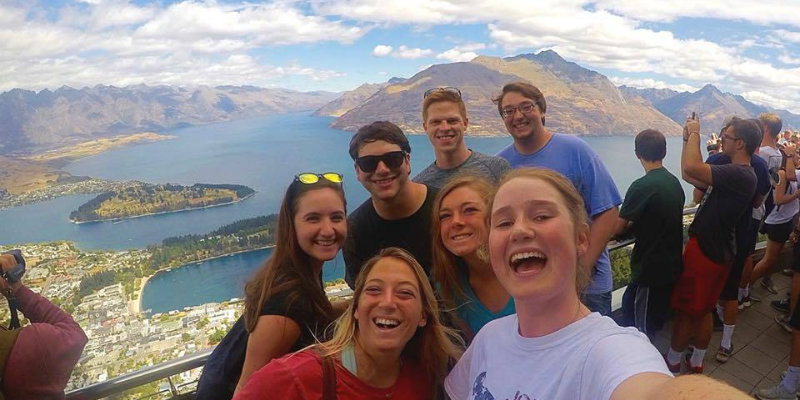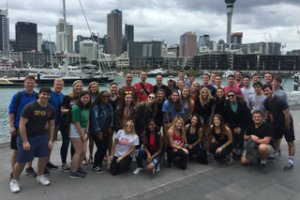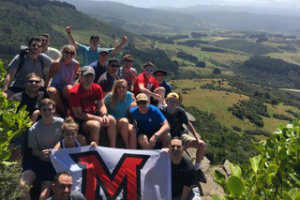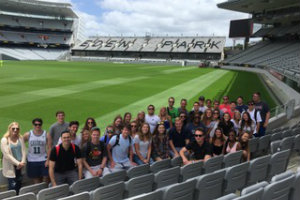Studying Abroad in New Zealand Shows the Social, Cultural, and Political Sides of Sport


James M. Loy, Miami University
Listen to the audio podcast
Read the story
Until recently, the furthest Allie Rock had ever been from home was after she moved away to attend Miami University. But this was far different than a road trip from Washington D.C. to Oxford, OH.
“Even being at Miami was a big step for me,” Rock says. “So going to New Zealand really put me out of my comfort zone. Going there really scared me. But now that I’ve had that experience in a different culture, in a different place, it’s opened me up to so many things.”
Rock is now a senior majoring in sport leadership and management (SLAM). And now that she’s returned from her first study abroad, she’s joined a long Miami tradition that combines rigorous academics with rich intercultural experiences.
 Every year, nearly 2,000 students from across the university participate in hundreds of similar global opportunities that inspire the kind of cultural illumination that can only occur after being immersed in a foreign locale. And the New Zealand program, which specializes in the management, culture, and global enterprise of sport, is no exception.
Every year, nearly 2,000 students from across the university participate in hundreds of similar global opportunities that inspire the kind of cultural illumination that can only occur after being immersed in a foreign locale. And the New Zealand program, which specializes in the management, culture, and global enterprise of sport, is no exception.
Because sport management is often viewed very differently in other parts of the world, seeing it abroad can be an eye-opening experience, especially for those who have only considered the industry from an Americanized perspective.
“The United States is probably the most distinct country in the world in that sport management is generally viewed as a career to generate revenue from a professional organization,” says Adam Beissel, Miami SLAM assistant professor. “Elsewhere -- in Australia and New Zealand, in Europe -- it’s more about how sport can be managed and delivered for a variety of objectives. Not solely for the accumulation of profit.”
This difference is key. And it’s perhaps most apparent through the way in which the government is heavily involved in the industry.
Alongside the professional private sector and various of non-profit organizations, a municipal government-based branch called Sport New Zealand is also responsible for overseeing everything from youth participation in sport to elite Olympic level athletes. Here, Sport New Zealand is prime example of how a social investment in a grassroots sport-based infrastructure is viewed as vital pubic service to local communities.
 “That approach is what’s really unique about New Zealand,” Beissel says. “It offers our students a comparison point for studying the delivery and benefits of sport to society.”
“That approach is what’s really unique about New Zealand,” Beissel says. “It offers our students a comparison point for studying the delivery and benefits of sport to society.”
This contrast is also highlighted by how sport in New Zealand is deeply woven and channeled throughout a larger collective national identity. Unlike in America, where personal interests commonly divide fans based on individual allegiances to different teams or cities, New Zealand tends to unify itself.
“I am obviously a USA fan when the Olympics come on,” Rock says. “But I would define myself as a Washington D.C. sports fan. Whereas New Zealanders get behind their All Blacks rugby team. Everyone gets behind it. That’s an example of how I didn’t realize that New Zealanders look at sports completely differently.”
For students, these new experiences are also complemented with a whirlwind tour of the country, which spans across Auckland, Wellington, Dunedin, and Queenstown. Each distinct location serves as a focal point for additional learning opportunities that cover a variety of academic lectures as well as meetings with sport managers and executives, media corporations, marketing agencies, and site visits to several stadiums and facilities.
Students also complete a separate experiential component by seeing a few professional teams in action and by actually playing sport themselves including several local favorites like rugby, cricket, and netball.
It’s a lot to pack into three weeks. But the students somehow manage to absorb it all. And more.
“On the weekends we had free time to explore,” says Miami student Carmen Gianguzzo. “It was just incredible. And we were constantly moving.”
These experiences help students expand their understating of the world and their relationship with it. But they also illustrate what else is possible.
Many students who initially pursue a SLAM degree often dream of becoming general managers or an otherwise integral part of a high profile professional team. But there are so many more opportunities and ways to connect with people and communities through sport.
“The reality is some students will do nonprofit or sport for development work and try and help the inner city kids improve their academic standing by playing basketball or joining rec clubs, and there is a really strong sense of that in New Zealand,” Beissel says. “So they can borrow those philosophies and that kind of practical management and apply it to their careers.”
For Rock, the experience was everything she thought studying abroad could and should be. It was enlightening and rewarding, thought provoking and exhilarating, and it was an inspiring way to become a more engage global citizen.
“It really embedded in my mind how the U.S. does things completely differently, and I didn’t really realize that until I was immersed in a different culture,” she says. “It makes me want to go study somewhere else. Before, I was so scared to leave the country. But now -- after seeing that -- where else can I go? The world is so different. I want to see it for myself.”

